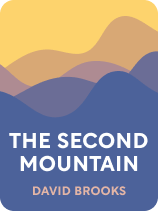

This article is an excerpt from the Shortform book guide to "The Second Mountain" by David Brooks. Shortform has the world's best summaries and analyses of books you should be reading.
Like this article? Sign up for a free trial here.
Would you like to be more open-minded and objective? Do you value truth above all?
In The Second Mountain, David Brooks argues that the relationalist approach (the “second mountain” he endorses) requires a commitment to the intellectual life. It’s the pathway, he says, to our highest desires.
Continue reading to learn how intellectual pursuits lead you upward and onward.
The Intellectual Life
Intellectual pursuits, according to Brooks, should involve the relentless search for truth and moral development. Brooks suggests that we should commit to the intellectual life because it teaches us to pursue the highest desires—like truth, wisdom, and flourishing.
(Shortform note: The notion of truth, wisdom, and flourishing being higher desires remains contentious; according to hedonistic theories of ethics, for example, pleasure is the only intrinsically valuable desire. According to this view, then, pursuing truth and wisdom is only valuable insofar as it maximizes pleasure.)
To show as much, Brooks outlines an array of virtues from the intellectual life that he says help elevate our desires. And though he lists more, we’ll focus on three key virtues: open-mindedness, objectivity, and intellectual courage.
First, Brooks observes that the intellectual life requires exposure to the varying moral worldviews that were prominent throughout history—including, for instance, the Greek moral system that prized honor and the Christian moral system that prized humility. In turn, intellectual commitment fosters open-mindedness and the ability to evaluate these varying moral systems.
(Shortform note: Although exposure to alternate worldviews might normally lead to open-mindedness, Matthew Syed clarifies that this isn’t always the case. In Rebel Ideas, Syed argues that those in echo chambers—which undermine trust in alternate views by attacking their proponents—actually become more entrenched in their own beliefs when exposed to different views.)
Next, Brooks claims that intellectual commitment helps us perceive the world more objectively, rather than through the lens of our prejudices and biases. This consequently teaches us humility, as it forces us to recognize the biases that distort our thinking and discard them.
(Shortform note: Brooks’s claim that intellectual commitment helps us overcome our biases is complicated by the fact that many of our biases are implicit, lurking in our subconscious. Indeed, in her book, Biased, Jennifer Eberhardt even argues that the majority of our biases are implicit, making them harder to uproot. To address such biases, Eberhardt recommends examining our assumptions slowly and methodically, as implicit biases arise frequently in quick, intuitive forms of thinking.)
Finally, Brooks asserts that the intellectual life teaches us intellectual courage, the capacity for seeking out what is true rather than merely what is popular. Although this won’t satisfy the ego’s vain desire for approval and recognition, Brooks implies that it satisfies our deeper desire for truth and knowledge.
(Shortform note: Though Brooks claims that intellectual courage forbids us from forming beliefs to earn popularity, some philosophers go a step further—one philosopher, for example, argues that intellectual courage requires us to seek the truth when doing so threatens our well-being. On this account, intellectual courage isn’t just a matter of not forming beliefs to be well-liked, but rather forming beliefs that will actively result in our being disliked.)

———End of Preview———
Like what you just read? Read the rest of the world's best book summary and analysis of David Brooks's "The Second Mountain" at Shortform.
Here's what you'll find in our full The Second Mountain summary:
- The negative consequences of the West's focus on individualism
- Why you should embrace relationalism to lead a fulfilling life
- The four commitments that constitute relationalist living






